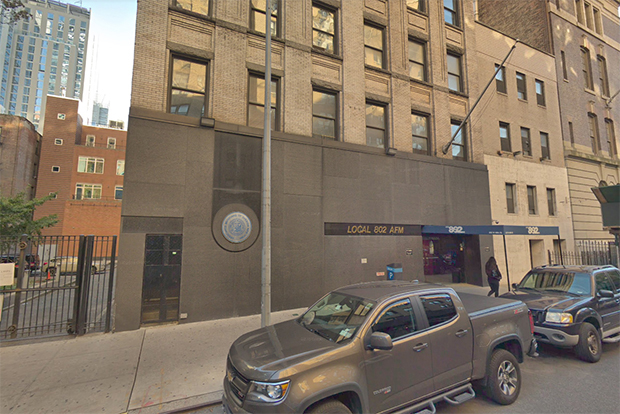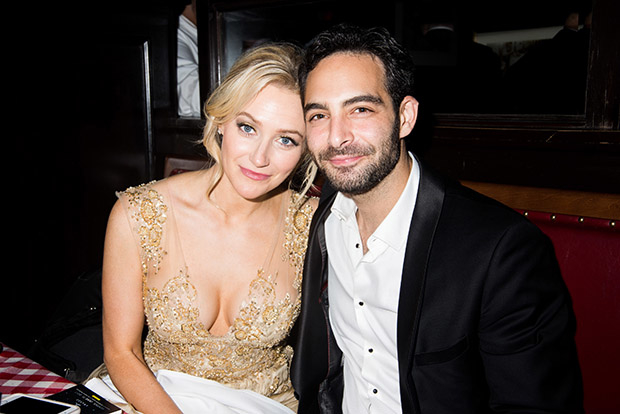Story of the Week: The Drama Between Be More Chill and the Musicians' Union Explained

(© Maria Baranova)
Be More Chill is one of the most highly anticipated musicals of this Broadway season. The story of a high school dweeb who implants a tiny Japanese supercomputer in his brain in order to learn how to "be more chill," it was already an international sensation before it played a sold-out run off-Broadway last year. Its fandom has spread virally on the internet, so it should come as no surprise that social media is the avenue through which the backstage drama of this ultramodern musical is spilling out into the public.
On February 18, the show's orchestrator and hitherto second guitarist, Charlie Rosen, posted a lengthy Facebook status explaining that he was no longer playing in the pit of Be More Chill following a visit to the production from Local 802 president Adam Krauthamer, who informed the musicians that Rosen's position in the orchestra was a violation of the union's collective bargaining agreement (CBA). Rosen (who has since updated his post) was distressed by what he perceived as unfair treatment by the union, laying the blame specifically at the feet of Krauthamer. How did this happen, and what does it mean for the future of live music on Broadway?

(© Google Maps)
What is Local 802?
Local 802 is the short name for the Associated Musicians of Greater New York, the local chapter of the American Federation of Musicians. It is the largest local union of professional musicians in the world, representing musicians at the Metropolitan Opera, the New York Philharmonic, and in pit orchestras on Broadway.
Consequently, Local 802 is responsible for negotiating the CBA with producers that governs the employment of pit musicians and other musical staff (orchestrators, music directors, etc.) on Broadway. According to that agreement, "No Orchestrator of a given production may serve as Orchestra Contractor, Supervisor Copyist, Copyist or Instrumentalist on that production." That puts Rosen's double role as orchestrator and instrumentalist in clear violation of the rules.
Why would such a rule exist?
It likely exists to increase the number of musicians employed by a production. If one person is doing the job of both orchestrator and guitarist, it prevents a second person from being paid for one of those roles. Of course, this assumes a clear border between jobs in a workplace that has always been highly collaborative: In the program for Waitress, the orchestrations are credited to "Sara Bareilles & The Waitress Band." This would seem to put the entire band of Waitress in violation of the CBA.

(© David Gordon)
Is that the crux of Charlie Rosen's complaint?
Partly. Rosen seemed most offended by the abruptness of this announcement, which he said occurred "2 hours before the invited dress rehearsal" and "without warning." He later corrected this statement, writing on February 20, "The Be More Chill team was made aware by the union that there was an issue with compliance in the language of the CBA a week before Adam came and spoke to the band. Unfortunately, due to a miscommunication on our side, not everyone was told about the issue." Rosen seems to imply that the producers knew this was an issue, but he and the band were not told until the last possible moment, when Krauthamer came to call.
But beyond that failure to communicate, Rosen took issue with the rule itself: "I gain much more insight about how the music plays down when I'm performing my orchestrations in real time," he wrote, calling regular performances with the band a "beneficial part of my process." If playing the music eight times a week is an essential part of Rosen's creative process, this rule would seem to severely limit him.

(© David Gordon)
How are people responding?
Comments under Rosen's Facebook post were overwhelmingly supportive, with several fellow musicians questioning the usefulness of this "arcane" rule when the border between orchestrator and musician is increasingly porous. Alice by Heart music director Jason Hart asked, "If I am the orchestrator on a show, am I allowed to be the music director? What if I music direct from the piano? Am I now considered an instrumentalist?" This is not just a hypothetical question. Others pointed out that there is actually precedent for orchestrators performing in the pit, most notably Alex Lacamoire of Hamilton. However, a close examination of the CBA seems to offer an exception for musician-conductors (like Lacamoire) as opposed to nonconducting musicians (like Rosen).
Rosen concluded his initial post with a call to arms, urging fellow musicians to attend Local 802's February 27 membership meeting in a show of support for overturning the rule. To this, Hairspray composer Marc Shaiman responded, "I will be there with bells on (that is, if Local 802 doesn't also have some arcane rule that a composer is not allowed to wear bells!)."

(© Monica Simoes)
Why is the timing significant?
The meeting on February 27 isn't just a matter of routine. Next week, Local 802 is set to begin the process of renegotiating the CBA that was struck with Broadway producers in 2011. That agreement (extended in 2016 via a memorandum of understanding) is set to expire on March 3.
Krauthamer (who previously played French horn in the pit of Frozen) will lead those negotiations. He was elected President of Local 802 just this past December, defeating a nine-year incumbent and signaling a generational shift at the union. Krauthamer ran on a platform of innovation, calling for more flexible contracts to cover musicians who don't fall into a traditional framework. "The rest of us, as musicians, have adapted to our market," he said, "but our union is stuck in the past."
For now, the rapid boil of drama has settled into a simmer, with Krauthamer and Be More Chill general manager Lisa Dozier King issuing an amicable, if vague, joint statement committing to their "productive" relationship. As noted above, Rosen has also posted a new statement to Facebook, blaming his earlier consternation on a miscommunication, and insisting, "The producers and the musicians' union are working amicably together to have a productive and collaborative conversation about next steps for our production." (UPDATE: Local 802 has issued a public letter stating its intention to initiate a grievance procedure against the producers of Be More Chill.)
The drama with Be More Chill aside, one hopes that the forthcoming negotiations between producers and Local 802 will seriously consider the ever-morphing roles of musicians on Broadway, as Krauthamer highlighted in his recent campaign pledges. Fitting art into a neat legal framework is never easy when the job of artists is to push against such boundaries; but it is absolutely necessary to have some ground rules if artists are to be properly compensated for their work. As with all jobs in the so-called "gig economy," the future belongs to those who can deliver flexibility that doesn't devolve into exploitation.










